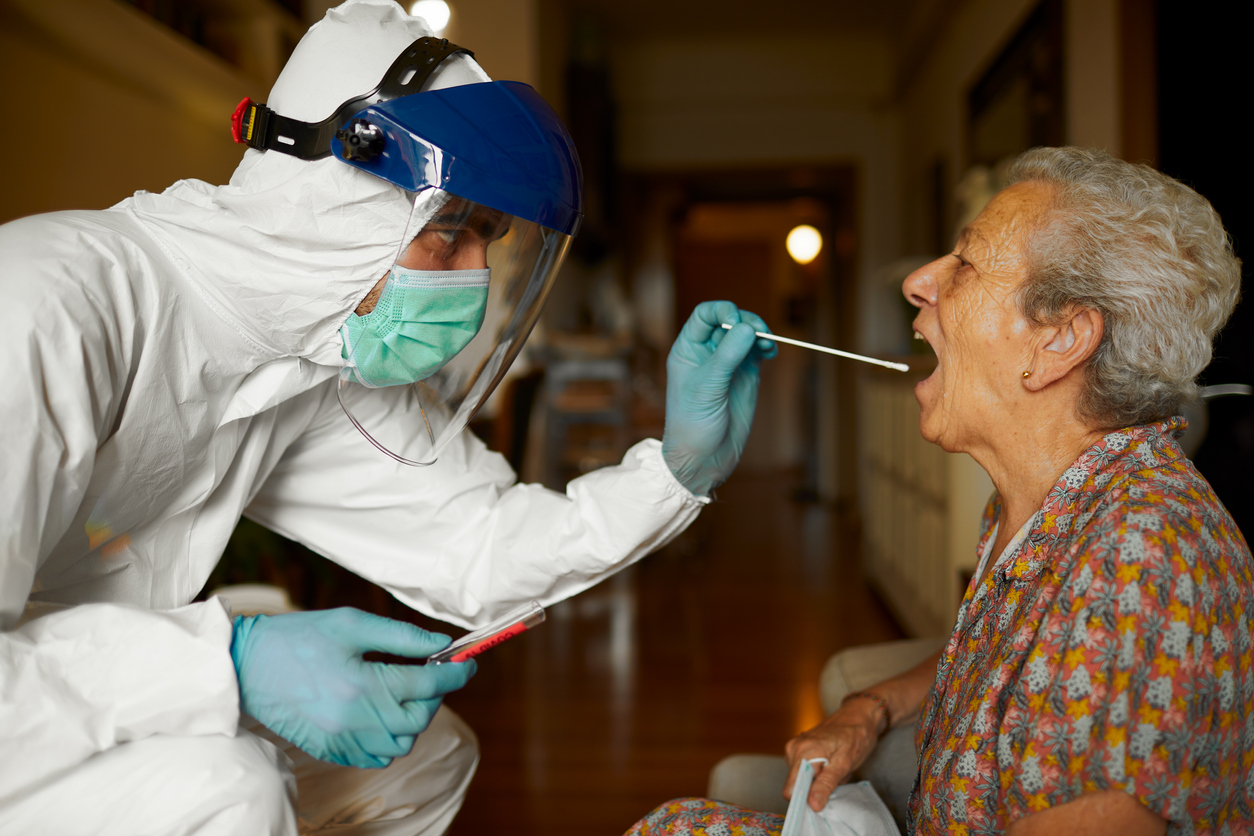The COVID-19 pandemic has dramatically changed the healthcare landscape in the United States. The long-term care industry has been especially hard-hit, forcing senior care centers to implement new safety practices as a means of protecting vulnerable elderly residents. Assisted living facilities (ALFs) are among the care centers that have witnessed thousands of deaths. As a core component of ALF risk management, it is critical that facility managers understand COVID-related risks and how they may affect operations well into the future.
Senior Care Centers Affected by COVID-19
To put the dangers of COVID-19 on residents of ALFs and other long-term care facilities in perspective, it can be valuable to take a look at alarming statistics. According to a regularly-updated database compiled by the New York Times, approximately 7% of all cases in the U.S. are centered on long-term care centers. Unfortunately, a disproportionate number of deaths have occurred; about 40% of all COVID-related deaths in the United States have occurred at nursing homes and senior centers. As of September, 2020:
- 77,000 residents and workers in long-term care facilities have died from the coronavirus;
- 479,000 residents and staff members of long-term care facilities have been infected; and
- 19,000 facilities across the U.S. have been affected by the novel coronavirus.
Why are ALFs at Risk from COVID-19?
Elderly residents of nursing homes and assisted living facilities are at greater risk of contracting and succumbing to the virus that causes the severe respiratory illness known as COVID-19. ALF risk management looks at common factors to gain an understanding of risks in these facilities. Risks include:
- Residents with underlying health conditions (“comorbidities”) that can complicate infection response and treatment.
- Confined and close-knit living environments.
- Infection spread as visitors enter and leave the facility as well as from staff moving from room to room within the facility.
ALF Risk Management: Protecting Vulnerable Seniors with Infection Control
In the wake of the coronavirus pandemic, ALFs and other long-term care facilities have had to take a hard look at current operations. Infection control has long been a part of the care model in these facilities, but the highly-contagious nature and life-threatening consequences of COVID-19 make those infection control practices even more critical.
To combat the spread of coronavirus within facilities, stronger infection control practices have been implemented. Infection control begins at the entrances to many facilities, with rigorous screening protocols for anyone entering. ALFs have encouraged or even mandated residents, staff, and visitors to wear protective masks upon entering facilities. In addition, immunization and vaccination requirements have been tightened. To further curtail infections, more stringent cleaning and disinfection of high-touch surfaces and common areas have also been shown to reduce the spread of deadly infections. Senior care industry analysts suggest that these cleaning and disinfection practices will become a part of the long-term care model for many years to come.
A New Dawn for Assisted Living Facilities?
Thousands of deaths have occurred within long-term healthcare facilities across the United States. ALFs and nursing homes have risen to the occasion, implementing safety strategies to halt the spread of the coronavirus. Not all is grim, however; the long-term care industry has experienced several unexpected and positive developments in the wake of the pandemic.
First, the pandemic highlighted the important role ALFs play in the American healthcare system. In many cases, healthcare providers were able to send COVID-positive individuals to ALFs for treatment and recovery, reducing the strain on already-stressed hospitals and emergency medical centers. With enhanced care available in long-term care facilities, hospital readmission rates have declined, lowering costs associated with hospital stays in the process.
Second, relationships have been forged during the pandemic. Hospitals and primary care providers have gained a better understanding of the role ALFs play in healthcare, and many facilities have developed beneficial partnerships with local and state health departments. Transparency in communication between residents and staff is a vital component of ALF risk management. Forward-thinking facilities have improved communication between stakeholders, including the family members of residents.
Many ALFs rely on guidance from local health officials to prevent the spread of dangerous infections like the novel coronavirus. By creating partnerships with these agencies, residents and staff have been able to stay abreast of developments as new infection control and prevention strategies are implemented. Industry analysts expect these new relationships to carry well into the future, strengthening an important part of the overall healthcare landscape.
About Caitlin Morgan
Caitlin Morgan specializes in insuring assisted living facilities and nursing homes and can assist you in providing insurance and risk management services for this niche market. Give us a call to learn more about our programs at (877) 226-1027.


